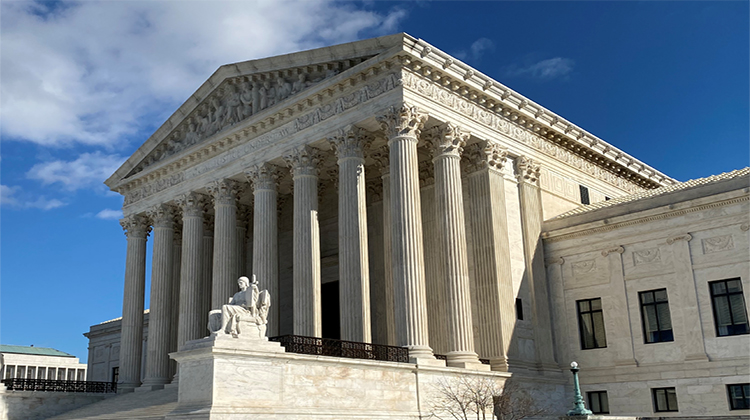When the U.S. Supreme Court term began last fall, the docket contained a number of major cases but had little of the potential blockbuster nature of recent prior terms. What a difference a few months make. The justices are now on the cusp of what may be the most important term in decades for the nation and the rule of law.
 Much has been said and written about what the Supreme Court might do if it considers claims by former President Donald Trump that he is immune from prosecution for actions connected with the Jan. 6, 2021, assault on the U.S. Capitol, as well as challenges to his eligibility to be president because of Section 3 of the 14th Amendment.
Much has been said and written about what the Supreme Court might do if it considers claims by former President Donald Trump that he is immune from prosecution for actions connected with the Jan. 6, 2021, assault on the U.S. Capitol, as well as challenges to his eligibility to be president because of Section 3 of the 14th Amendment.
But the stakes in the term have grown steadily since the fall with the addition of cases that the justices have agreed already to decide. The justices return to the bench for oral arguments on Jan. 8 after their holiday break. And with the new year, they should begin to increase the pace of decisions.
Here is a refresher on what is pending argument or decision so far this term.
Second Amendment Cases
The Court heard arguments in November in their most important gun rights case since their 2022 ruling in N.Y. State Rifle and Pistol Association v. Bruen. In United States v. Rahimi, the justices will decide whether the Second Amendment is violated by a federal law prohibiting the possession of firearms by individuals subject to domestic violence protective orders.
Most of the justices seemed reluctant during arguments to invalidate the law.
There is a second gun-related case awaiting an argument date: Garland v. Cargill. The Biden administration is defending the federal law’s definition of a bump stock as a “machinegun.” A third, somewhat unusual gun case, also not yet scheduled for argument, is a challenge by the National Rifle Association. The NRA claims a New York state official violated the First Amendment when she allegedly threatened banks and other regulated entities with adverse actions if they did business with the NRA.
Other Major Cases
Awaiting decision is a case argued in October that involves the often close relationship between race and political party affiliation. South Carolina has challenged a lower court ruling that one of its congressional districts is an unconstitutional racial gerrymander. The state contends the district was drawn by the Republican-led legislature, not with race in mind, but to ensure a safe Republican seat.
The term is potentially huge for social media platforms and the First Amendment. The justices heard two arguments in November about public officials’ use of their personal social media accounts and whether they can block critics. Not yet scheduled for arguments are cases from Florida and Texas whose content moderation laws are challenged by NetChoice. And a separate challenge is by the Biden Administration to a lower court order blocking administration officials from communicating with social media companies about their content moderation policies. The injunction was sought by Missouri and Louisiana.
The efforts by conservative groups and the business community to rein in the so-called regulatory state appeared to face some serious obstacles with a number of justices during October and November arguments. The two cases involve challenges to the funding mechanism for the Consumer Financial Protection Bureau and to the administrative enforcement proceedings before the Securities and Exchange Commission. The third leg of this effort asks the justices to overrule a 40-year-old decision in which courts are required to defer to a federal agency’s reasonable interpretation of an ambiguous statute. Two cases asking for the overruling of the Chevron deference precedent will be argued Jan. 17.
The Trump Cases
The one Jan. 6 related case, so far, that the justices will decide involves interpretation of a federal law prohibiting obstructing, influencing, or impeding an official proceeding. More than 300 Jan. 6 defendants, including Trump, were charged under that law based on their efforts to prevent congressional ratification of the 2020 presidential election results.
Finally, even if the justices do jump into the Trump immunity and Section 3 challenges pending in the lower court, one of the biggest headlines of the term will once again involve abortion.
The justices have not yet scheduled an argument date for Food and Drug Administration v. Alliance for Hippocratic Medicine which arises from a challenge by a conservative, religious legal organization to the medication abortion drug, mifepristone. The Biden administration is defending changes made by the FDA to the use of the drug in 2016 and 2021.
Sometimes what appear to be the biggest cases of a term fizzle with the decisions, and sometimes cases flying under the radar become huge, again depending on the decision. What is certain is that there is much to watch closely in the next six months.
Marcia Coyle is a regular contributor to Constitution Daily and PBS NewsHour. She was the Chief Washington Correspondent for The National Law Journal, covering the Supreme Court for more than 30 years.







